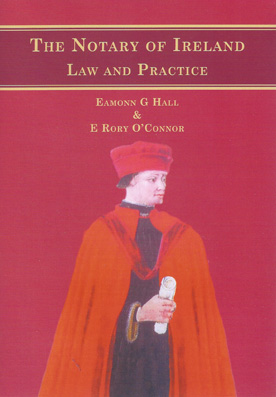
The legal profession in Ireland is divided into barristers, solicitors, notaries and legal executives. Of all the various legal professionals, the notary public is the oldest. In non-contentious legal business, the notary has a comparable standing to that of a solicitor or barrister of Ireland and has a unique place in international business affairs.
The profession of notary traces its origins to scribes in ancient Egyptian civilisation and the tabelliones of Rome. The tabelliones, professionals who transacted legal business, became prominent in Rome between the second and third century AD. The influences of the East, the importance of commerce in the Roman Empire and the necessity to have written legal documents governing transactions all fostered the development of the profession of notary. A significant evolution of the notary was when notarii became secretaries to the authorities – principally the Emperor and leading ecclesiastics.The Emperor and the Pope appointed notaries and the status of the notary subsequently flourished on mainland Europe. In the days of Charlemagne (742-814), whose empire united most of Western Europe, instruments drafted by notaries on the continent of Europe acquired the same status and effect as a conclusive judgment. Such is the same to-day on mainland Europe with the notary’s authentic instrument.
Christopher Columbus took a notary with him on his epic voyage to America (c.1492) to certify the truth of what he saw and to take possession of the land. There is written evidence extant of the appointment of notaries in Ireland in the thirteenth century. For example, Pope Honorius IV (Pope 1285-1287) granted a faculty to the Archbishop elect of Dublin, John de Sandford, in 1286 ‘to confer the office of notary on two fit persons’.
The Pope appointed notaries for Ireland for some time. Henry VIII (1509-1547) ended the association with Rome and the appointment of notaries by the Pope. Subsequently, notaries in Ireland were appointed by the Court of Faculties (Ireland), the Lord Archbishop of Armagh, and later by the Lord Chancellor of Ireland and the Lord Lieutenant.
On the foundation of the Irish Free State, the jurisdiction to appoint notaries was conferred on the Chief Justice. To-day, the appointing authority for notaries in Ireland is the Chief Justice. The association of the notary of today with the careful attention to legal documents has a resonance of earlier times in the great officer known as the prothonotary or protonotary. The prothonotary was known in England since 1447 and was an officer of the court. The word derives from Greek protonotarios ‘first scribe’ – (originally the chief of the college of recorders of the court of the Byzantine Empire) and the Latin word notarius (notary).
The title of prothonotary was also awarded to certain high-ranking notaries. There is evidence of the prothonotary functioning as the chief secretary of the Byzantine Emperor. In the Roman Catholic Church, the protonotaries (sic) apostolic (protonarii apostolicii) belonged to the College of Protonotaries Apostolic. In the late sixteenth century, Sixtus V established the College of Protonotaries at twelve members and subsequently in 1838 Gregory XVI determined that number at seven members.
These protonotaries were engaged with the documentary work in the process of canonisation and of consistories; they examined candidates in theology and canon law and conferred a certain number of degrees. There were also Honorary Protonotaries – canons of the basilicas of St Peter’s Rome and other basilicas. The Pope granted the title of protonotary to priests of distinction who were entitled to use the vestments proper to bishops, with certain modifications. [See S.G.A. Luff, The Organisation of the Church, (London) (1962).
The prothonotaries of Ireland were formerly the chief officers of the Courts of the Common Pleas and Queen’s/King’s Bench who held their offices by patent under the Crown during good behaviour. [See Common Law Procedure (Ireland) Act 1821 c. 53. s.3] These officers were responsible for the appointment of the general clerks of the courts and had the authority of dismissing them at pleasure, being responsible for their acts. The duties of the prothonotaries were to superintend the conduct and proceedings of the several other officers of the court, to inspect their offices, and the several records, books papers, and documents, and (where appropriate) to admonish the officers; and if necessary to report the facts to the court; and to make special reports of the practice of the court to the judges. [See generally Common Law Procedure (Ireland) Act 1821 c.53.]
The title of prothonotary for civil lawyers and court officials no longer exists in Ireland.
To-day, as stated above, the notary public in Ireland is appointed by the Chief Justice in open court after the candidate notary (who is either a practising barrister or solicitor with five years post-qualification experience) has been awarded the postgraduate Diploma in Notarial Law and Practice by the Faculty of Notaries Public in Ireland/The Institute of Notarial Studies. A notary public in Ireland may, in general terms, conduct legal business but has no role in what is termed ‘contentious business’ i.e. the conduct of cases in court.